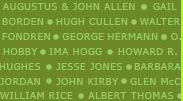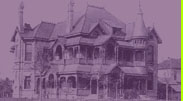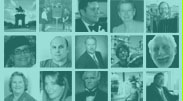TIMELINE 1950 - 1960
1950
Ship arrivals numbered 3,721, with a combined barge and ship freight of 40,825,048 tons
The city's population was 596,163, a jump of 55.5 percent over 1940. Houston's black population was 150,452, 19 percent of the total
The city included 1,174 manufacturing establishments producing goods annually valued at $781,600,000. Chief among the products were foods, chemicals, petroleum, iron and metal goods, and heavy machinery
Bank deposits since 1940 increased 282 percent
Automobile registrations in Harris County stood at 322,000, an increase of 89.4 percent over 1940
In a vote to test public sentiment, organizations such as the Council for Free Enterprise helped defeat public housing
January 24
Five blacks filed suit to gain access to the Municipal Golf Course
February
George R. Brown, Vice President of Brown & Root, Inc., is named chairman of the board of Trustees at Rice Institute
May 27
The Pasadena Tunnel was opened under the ship channel. This, and another tunnel opened three years later, alleviated traffic congestion and eliminated the need for ferry service on the channel
July
Staff Sgt. Nyle S. Mickley, Jr. of Houston is credited with shooting down the first North Korean plane of the Korean War
October
Ground is broken for the 18 story Prudential Insurance Company building to be located near the Medical Center
December 25
Ground was broken for a hospital for cancer research
Rice Institute completes the 70,000 seat Rice Stadium
William Goyan of Houston publishes House of Breath
Houston Westbury baseball team wins world Little League title
1951
Construction was begun on the Houston International Airport
(William P. Hobby Airport as of 1967)
Texas State University for Negroes became Texas Southern University
With the slogan, "Guarding the Land We Love," the Minute Women were formed. A local branch of a national anticommunist group, they watch dogged government and school officials, especially teachers
February
Houston, already crippled by sleet, snow, and freezing rain, has a low of 15 degrees and all schools are closed
February 24
The University of Houston cancelled a speech by Dr. B. Kumarappa, India's representative to the United Nations, because of the man's anti-American views
May 27
W. F. Heavey outlined plans for $21,000,000 worth of channel improvements
July
A gang riot erupts near Playland Park and 36 youths are jailed
October
Mrs. George L. Downs purchases the 100,000th television set to be sold in Houston
October 13
Rice Institute was presented with a Van de Graff accelerator (atom-smasher) by the Atomic Energy Commission
1952
Ship arrivals at Houston's Port numbered 3,769, and tonnage freighted on the channel stood at 46,608,420 tons. For the first time, tonnage was valued at over $2,000,000,000
The University of Houston and the Independent School District were given the old facilities of KPRC-TV by the Hobby family. The resulting KUHT-TV became the worlds first educational TV station in May 1953
This year marked the high point for the Minute Women, who now claimed 1,000 members. They elected Mrs. F. G. Dyer to the school board on an anti-UNESCO platform and were in the vanguard of the attack on deputy school superintendent George W. Ebay
A black man became the foreman of a Houston jury for the first time since Reconstruction
Houston recorded 134 murders
February
Sheriff C. V. (Buster) Kern and Ranger Johnny Klevenhagen physically assault lawyer Percy Foreman after Diego Carleno is found not guilty of murder
March
On land donated by Will and Susan Clayton, the city opened its first housing project since World War II. The 348-unit project was mainly for Latin Americans
June
Billy Graham announced, "Most Houstonians will spend an eternity in hell."when he preaches to 60,000 people in Rice Institute Stadium
August 1
The Gulf Freeway between Houston and Galveston was completed. State and federal governments funded 86 percent of it
"Shivercrats" bolt the national Democratic Party to support Eisenhower
Dwight David Eisenhower elected president
October
Judge Roy Hofheinz, boy wonder of Harris County, announces he will run for Mayor
1953
Roy M. Hofheinz became mayor of Houston
The NAACP protested segregation in the cafeteria of the new County Courthouse
The Baytown-LaPorte tunnel under the ship channel was opened
At a school board meeting, an attorney, John P. Rogge, accused of being a "Commie." The FBI declared him "clean as a whistle." and a 348-page report by the General Research Company found no communist connections
January
Frank Lloyd Wright, 83, is in Houston for a speaking engagement
April
The home of Jack Ceasar is rocked by a dynamite explosion in the first episode of open violence to make Ceasar move out of the white neighborhood
June 5
In a warehouse off Rosine, between West Dallas and West Clay, sparks ignited a fireworks display under assembly, setting off 45,000 pounds of explosives. The ensuing explosion and fire at the Alco Fireworks and Speciality Co. warehouse killed four people, including two children and their mother (Jean Walton in her early 20s, and Cathy Walton age 4, John Walton age 2, and their neighbor Jessie Jane Oates Barziza also in her early 20s)
September
After a bitter fight, Houston voters rejected an $18 million bond issue to purchase private docks in Long Reach and construct new facilities
The 11th annual Harris County Fair is held
October 11- 21
Journalist Ralph O'Leary wrote an award winning series of articles for the Houston Post on the Minute Women. Putting together names, dates, and facts, the series drained the movement of much of its venom
KUHT, the first education television station in the U.S. begins broadcasting from the campus of the University of Houston
Lyndon B. Johnson elected minority leader of U.S. Senate
Oveta Culp Hobby of Houston named U.S. Secretary of Health, Education, and Welfare
1954
Ship arrivals at the Port numbered 3,574, and combined barge and ship freight on the channel totaled 43,244,841 tons
The Rehabilitation Committee of Downtown Houston was founded as yet another effort to revive the area between Buffalo Bayou and Texas Avenue
Segregation on city buses was ended
Houston's water supply was increased with water from a reservoir created by a dam on the San Jacinto River
KPRC-TV made Houston's first color broadcast
March
U.S. Representative Albert Thomas is almost hit by gunfire in the House of Chamber
April 21
Senator Joe McCarthy spoke on San Jacinto Day. An anticipated crowd of 40,000 failed to materialize; only about 4,200 heard the senator
May
Plans are announced by former Mayor Oscar Holcombe to build a $4,000,000 shopping center at South Park Blvd. and Griggs Road
July
The Chamber of Commerce held "M Day" to celebrate the addition of the metropolitan area's (Harris County) millionth citizen
September
Mrs. Annie Battlestien, 81, wife of the founder of Battlestien's Department Store, dies in Houston.
October 29
Houston International Airport was opened
December
The University of Houston was granted full accreditation by the Southern Association of Colleges and Secondary Schools
Valerie Bettis of Houston choreographs A Streetcar Named Desire for American Ballet Theatre and dance the lead role with Scott Douglas of El Paso
1955
The Nation's twelfth largest city ranked fifty-seventh in support of public libraries
Houston's Port dropped to fourth nationally in terms of tonnage handled
A biracial school committee suggested desegregation immediately "if the superintendent finds it possible, under existing circumstances"
Private cars and traffic congestion continued to mount. A test showed that one mile at 5:30 P.M. downtown took seven minutes and forty seconds
January
If present trends continue, Houston babies born this year will have a life expectancy of 137 years
May
Sugar is selling in the stores for 35 cents a five pound bag
July 25
Mayor Hofheinz offered to stand trial in the face of an impeachment move by the council. The mayor and council were embroiled in a dispute over proposed charter amendments that would have affected the power balance in city government
August 17
Voters approved a charter amendment to shorten city council terms by a year, and they approved new municipal elections for November. They defeated eighteen proposed amendments, backed by councilmen, which would have curbed the mayor's power and strengthened their own
August 27
City councilmen dropped their impeachment move against Mayor Hofheinz
October 17
The new Texas National Bank opened with its fifteen-foot weather ball on top
A group of citizens founds the Houston Ballet, which is the states first
November
Oscar Holcombe is elected Mayor of Houston again when he defeats Roy Hofheinz, the incumbent
1956
Oscar F. Holcombe again took office as mayor. He first did so in 1921
The Port of Houston recorded 3,754 ship arrivals with a combined barge and ship freight of 52,293,262 tons
Houston's geographic size doubled as it absorbed twenty-seven outlying districts
February
The worst duststorm in Houston's history drops visibility to 1/2 mile and kills 12 people
May 26
The Census Bureau noted a trend in population movement toward the suburbs
June
Over $240,000,000 in federal highway funds were made available to the Houston area
More than 100 girls are overcome by heat at City Auditorium while attending a Rainbow Girl Grand Assembly meeting
June 16
The aluminum-faced Bank of the Southwest opened
August 11
The city council designed a twenty-acre Sam Houston Park as a repository for the city's historic buildings
October
Houston is designated the "next target" by the N. A. A. C. P. in its fight to desegregate public schools
December
Sponsored by the NAACP, Dolores Ross and Beneva Williams filed suit to break the segregation policy of Houston's school system
The Houston Grand Opera gives its first performance
Bill Lillard of Houston wins last of six American Bowling Congress Championships
Houstonians approve a bond issue to facilitate the expansion of the port by widening the ship channel to 400 feet and deepening it to a size of 40 feet
1957
The Houston school board banned three books; a geography text whose foreword praised the U.N. , a text with a chapter entitled "It's All One World," and a text which claimed the government is obligated "to promote the welfare of all the people"
The city recorded 136 murders, the highest murder rate in the nation
January
The 1957 National Automobile show is held in Houston
January 31
Houston voters approved a critical bond issue for expansion of port facilities
The Port's future was assured when the state legislature unanimously passed a bill permitting the Port Commission to issue long-term revenue bonds secured by the port's future earnings
April
Dr. Paul Dudley White speaks to a group of area physicians
May
To head off criticism during impending law suits, the school board adopted a vague policy of no desegregation before the completion of the existing building program and none before 1960
July
The first jet touched down at the International Airport, making the three-year-old facility essentially obsolete
September
An estimated 40,000 people turn out to watch the 2nd Annual Southwest Championship Outboard Races on Lake Houston
October 4
The Soviet Union launches Sputnik 1, the first man-made Earth Satellite, wining Round 1 of a Cold War space race that lasted two decades
October 15
Federal District Court Judge Ben C. Connally ordered desegregation of public schools "with all deliberate speed"
The Houston International Airport opens 10 miles south of the Central Business District
End of a disastrous drought which began in 1950
1958
Lewis Cutrer became mayor of Houston
March
Over $1,000,000 is left to the Arabia Temple Crippled Children's Clinic by the late Mrs. Lillian T. Kincaid
June
The Pin Oak Charity Show is held in Houston
October 1
The National Aeronautics and Space Administration is established to guide U.S. space exploration
The Port recorded 4,337 ship arrivals with a combined barge and ship freight of 55,258,046 tons
Army engineers recommended deepening the channel to forty feet to permit passage of larger vessels
Houston was labeled "Murder town, USA" by Time Magazine for maintaining the highest murder rate in the nation, 15 per 100,000
Jefferson Davis Hospital, a city charity institution, was struck by an epidemic of staphylococcus infection. Two hundred and seventy-nine cases and seventeen deaths occurred and served to highlight the low quality of health care for the poor
November 5
Mrs. C. E. White elected to the School Board, the first black ever elected to that body
November 11
A cross was burned at Mrs. White's home
Defensive expert Slater "Dugie" Martin of Houston plays for St. Louis, the last of his five National Basketball Association championship teams
Kenny Rogers of Houston has his first national hit record with "Crazy Feeling"
December
Mayor Cultrer asks the State to check into the racket situation in Houston
1959
January
Baylor College of Medicine plans a new $4,500,000 expansion
January 7
The first Port revenue bonds were approved by the Port Commissioners. It was a $12,500,000 issue to finance port improvements
January 13
Mrs. C. E. White was sworn in as a school board member without incident
February 3
Deaths of Buddy Holly of Lubbock and J.P. "The Big Bopper" Richardson of Houston in plane crash
A local millionaire and his wife anonymously contributed $7,000,000 to build the city's first Lutheran hospital
Professional football came to Houston with the Houston Oilers of the American Football League
April
Confronted with severe financial problems and declining enrollment, the University of Houston applied for full state support. The necessary legislature was passed and the measure implemented in September 1963
May
The NAACP filed a petition in the Federal District Court charging that no action had been taken on school desegregation
Lloyd Bentsen, Jr. and the Sheraton Corporation announce plans for a $15,000,000 hotel and office building to be located on the block bounded by Milam, Polk, Louisiana, and Dallas
July 1
District Court Judge Conally ordered the Houston School Board to prevent its integration plan by mid-August
August
The school board revealed a 373-page report to the District Court that it had no desegregation plan and requested additional time to prepare one. Judge Connally ordered the board to submit a plan by June 1, 1960
September
Five Houstonians and two Houston area residents are among 34 killed in a mid-air explosion of a Braniff turboprop airliner over Buffalo, Texas
November 7
The tanker Amoco Virginia exploded in the ship channel when its aviation gasoline cargo ignited. The resulting fire took eight lives and threatened the vast oil refinery and chemical industry complex along the channel
December 19
The first Bluebonnet Bowl was played in Rice Institute Stadium
American Football League formed by Lamar Hunt (owner of the Kansas City Chiefs), K.S. "Bud Adams (owner of the Houston Oilers), and others
1960
Houston's population of 938,219, nearly twice as many as the 596,163 counted in 1950, ranked it seventh in the nation. The city's metropolitan area included 1,243,158 people, making it the sixteenth largest. Houston grew seven times as fast as the average major city in the 1950s
Houston's port recorded 4,529 ship arrivals with a combined barge and ship freight tonnage of 57,132,659 tons
Houston remained primarily a commercial-distributive rather than a manufacturing center. Nationally, 27 percent of the labor force was involved in manufacturing, while the figure for Houston was 19.6 percent
Congress appropriated $19,000,000,000 to deepen the ship channel
A Civil Aeronautics Board examiner recommended Houston be placed on the proposed southern transcontinental route, thus giving the city direct jet service between Florida and California. The city purchased a 4,000-acre site for a new municipal airport
A committee set up by the mayor recommended zoning for the city
March
Roy Rogers and Dale Evens host the televised Chevy Show from the rodeo arena in Houston
April
Rice Institute became Rice University
May 4
Black students from Texas Southern University initiated the first sit-in in Texas, trying to force equal lunch counter service
July
Houstonians flood Washington with telegrams in a last minute attempt to save the homesite of Lorenzo de Zavala, a patriot of the Texas Revolution
August 4
District Court Judge Connally labeled the school board's desegregation plan a "palable sham and subterfuge." He ordered desegregation to commence in all first grades in September 1960 and to proceed at one grade per year thereafter
August 26
Houston was in the midst of a great building boom. To date for the year, the city had issued building permits worth $192,322,336, a jump of $50,000,000 over the same period for 1959
September 1
The U.S. Supreme Court rejected the Houston School Board's appeal to defer integration of public schools
September
Integration of first grades in Houston schools began with twelve black children attending "white schools," but it was occurring under restriction so limiting as to severely curtail black attendance in " white schools." For example, no black student could enter if the child had an older brother or sister in an all-black school. Thus, six years after the historic Supreme Court decision, only 12 out of the city's 46,000 black children enjoyed its benefits
The Houston International Airport is rendered inadequate
John F. Kennedy of Hyannisport, MA and Lyndon Baines Johnson of Johnson City, Texas, elected president and vice-president of the United States
A. J. Foyt of Houston wins the first of his seven U. S. Auto Club racing titles
Houston Oilers pro football team wins the first American Football League championship
Allen Drury of Houston awarded Pulitzer Prize for novel Advise and Consent
The census' decennial tally records 938,219 Houstonians, nearly twice as many as the 596,163 counted in 1950
November
The Hermann Park Zoo has acquired a rare spitting cobra named Marie who will grace the new $116,000 reptile house to be opened next month






